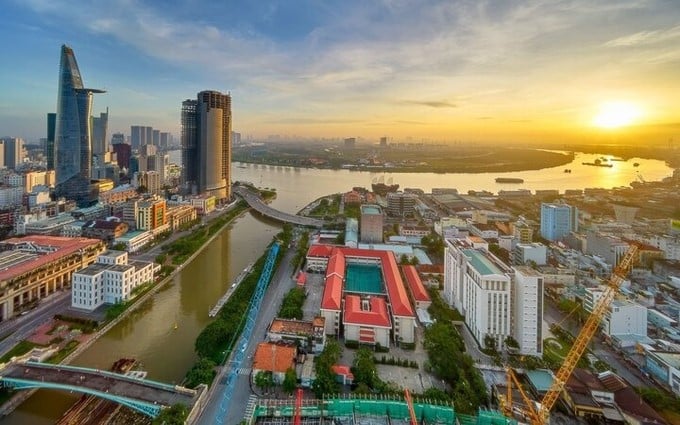November 20, 2025 | 17:21 GMT +7
November 20, 2025 | 17:21 GMT +7
Hotline: 0913.378.918
November 20, 2025 | 17:21 GMT +7
Hotline: 0913.378.918

The World Bank is optimistic about the economic development capability of East Asia.
The report updating the economic situation in the East Asia-Pacific region commented that recent trade tensions between the US and China have created opportunities for countries like Vietnam to strengthen their role in the global value chain by "connecting" with major trading partners.
"Vietnamese companies exporting to the US market saw revenue increase by nearly 25% compared to other markets in the 2018-2021 period," the report pointed out.
However, recent evidence leads the World Bank to predict that economies may be increasingly limited in playing a "one-way connection" role as new rules of origin and import-export restrictions are strictly applied.
China's neighboring countries have benefited from this country's strong growth over the past 30 years. However, the scale of this momentum tends to gradually decrease.
According to the World Bank, China has boosted other countries through importing goods, but import demand is now growing slower than GDP. Imports increased by only 2.8% in the first seven months of this year compared with nearly 6%/year in the previous decade.
The overall growth of the East Asia-Pacific region is forecast to reach 4.8% in 2024 but will slow down to 4.4% in 2025.
Growth of the region's largest economy, China, is forecast to decline from 4.8% this year to 4.3% in 2025 due to a prolonged weak real estate market, leading to low investor and consumer confidence. Besides it are structural challenges such as aging populations and global tensions.
Overall growth in the region, excluding China, is forecast to reach 4.7% in 2024 and 4.9% in 2025, thanks to increased domestic consumption, the recovery of goods exports, and increased tourism.
Among larger economies, only Indonesia is expected to grow in 2024 and 2025 at or above pre-pandemic levels. In contrast, growth in Vietnam, Malaysia, the Philippines, and Thailand is expected to be lower than before the pandemic.
Pacific island countries forecast growth at 3.5% in 2024 and 3.4% in 2025 as tourism recovers. At the same time, investment growth remains weak in many parts of the region.
Ms. Manuela Ferro, Vice President of the World Bank for the East Asia-Pacific region, acknowledged that the East Asia-Pacific region continues to be the growth dynamics for the world economy. However, the growth rate is slowing down.
"To maintain strong growth over the medium term, countries in the region must proactively modernize and reform their economies to adapt to shifting trade patterns and technological changes," she recommended.
The recently released report of the World Bank also points out three factors affecting growth in the region: trade and investment shifts, slowing growth in China, and increasing global policy instability.
Forecasting the coming time, the WB believes that global instability may negatively impact regional economies. In addition to geopolitical instability, increased economic policy uncertainties could reduce industrial production and stock prices in East Asia and the Pacific by 0.5% and 1%, respectively.
Industry, artificial intelligence, and digital platforms are transforming labor markets in the region. From 2018 to 2022, robot use has helped create jobs for about 2 million workers but also displaced about 1.4 million lower-skilled workers.
The proportion of jobs threatened by artificial intelligence is smaller than in advanced economies. However, Mr. Aaditya Mattoo, chief regional economist, commented: "East Asia's development model based on the open global market and labor-intensive production is being challenged by trade tensions and new technology. The best response is to take advantage of FTAs and equip the skills to take advantage of new technology."
Translated by Thu Huyen

(VAN) Amid vast floodwaters, the spirit of sharing and helping others shown by many people in Gia Lai reached tens of thousands of residents stranded by raging floods.

(VAN) Climate change is set to emerge as a key focus of collaboration within the framework of the Comprehensive Strategic Partnership between Viet Nam and New Zealand.

(VAN) Future veterinarians will be the ones directly deciding how antibiotics are prescribed, administered, guided and managed across thousands of farms nationwide.

(VAN) Argentine Ambassador Marcos Antonio Bednarski says Viet Nam is playing an increasingly influential role in Argentina’s economic and technical engagement in Southeast Asia, as Buenos Aires is seeking long-term partners.

(VAN) Prime Minister requested local authorities to use all available measures to reach residential areas that are deeply flooded, cut off, isolated, or affected by landslides.

(VAN) To confront historic flood surge on Ba and Kon rivers, the Prime Minister requested local authorities to mobilize all available forces, evacuate residents, and ensure reservoirs and dams safety.

(VAN) The United Kingdom (UK) has offered to assist Vietnam in accessing significant financial resources to drive agricultural innovation while simultaneously expanding the market for forest-based carbon credits.